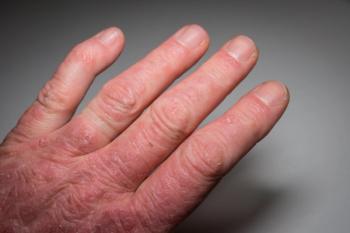
Clinical
Latest News

Latest Videos

CME Content
More News

Among women hospitalized with coronavirus disease 2019 (COVID-19), use of metformin—a type 2 diabetes (T2D) drug used to manage blood sugar levels—was associated with a 21.5% lower risk of death.

Inqovi is an orally administered, fixed-dose combination of the DNA hypomethylating agent, decitabine, and cedazuridine, an inhibitor of cytidine deaminase.

SEQUOIA arm D study results show better outcomes are possible for patients with 17p-deletion CLL, explained Ian Flinn, MD, PhD, director of lymphoma research at Sarah Cannon Research Institute.

An increase in primary rhegmatogenous retinal detachment incidence (RRD) may be associated with a simultaneous increase in myopia among citizens residing in the Netherlands, according to study results published in JAMA Ophthalmology.

The presence of migraine is a significant risk factor for the development of subsequent peripheral artery occlusive disease, according to results of a retrospective cohort study published in the International Journal of Environmental Research and Public Health.

During a session at the at the 18th annual World Congress Insulin Resistance, Diabetes & Cardiovascular Disease presented by the Metabolic Institute of America, experts outlined the benefits and limitations of pharmacological, surgical, and lifestyle interventions for pediatric patients with obesity.

The new data provide hope that the therapy will prove effective for a patient group with limited options.

Researchers from the University of California San Francisco published their results in the Journal of Urology.

One patient had a complete response and the majority of patients achieved disease control at 12 weeks.

In the real world, the persistence rate with secukinumab to treat psoriatic arthritis was higher than with ustekinumab.

Previous studies have suggested that migraine is linked with higher visual neuronal excitability, which can be inhibited through noninvasive brain stimulation.

The lead investigator touted the benefits of subcutaneous administration of daratumumab in relapsed multiple myeloma (MM) during a presentation on practice-changing results ahead of the American Society of Hematology annual meeting.

Updated guidance in 6 key areas of asthma care focus on improving diagnosis, management, and treatment.

As higher estimated glomerular filtration rate (eGFR) equations indicate better kidney function, there has been increasing recognition that this may lead to inequitable and delayed care in treating chronic kidney disease (CKD) in Black adults.

Results of a retrospective case series revealed an association between blood-brain barrier disruption (BBBD)–related maculopathy and the number of BBBD treatment sessions patients underwent, suggesting a dose-dependent effect of the treatment.

Use of selexipag in patients with connective tissue disease–associated pulmonary arterial hypertension (CTD-PAH) resulted in outcomes similar to those seen in patients with idiopathic PAH, despite the traditionally poorer prognosis of CTD-PAH.

Researchers assessed 3 risk factors for migraine in children and adolescents: stress, sleep poverty, and alimentation.

Certain antiretroviral therapy (ART) drugs can decrease contraception’s effectiveness, said Milena Murray, PharmD, MSc, BCIDP, AAHIVP, associate professor, Midwestern University College of Pharmacy.

As the only biologic on the market, dupilumab has replaced most of the more traditional treatments for atopic dermatitis, said David Pariser, MD, senior physician at Pariser Dermatology Specialists.

Severe aplastic anemia used to have few options and mortality was high, but a new class of drugs offers some hope.

It remains unclear whether measures of magnetic resonance imaging plaque characteristics are associated with cardiovascular disease events independent of plaque burden at the population level.

Among older women with and without breast and ovarian cancers, testing for the BRCA gene dropped precipitously between 2008 and 2018.

Intermittent hypoxia sensitizes control centers in the brain, noted Krishna M. Sundar, MD, clinical professor, Pulmonary Division, Department of Medicine, and medical director, Sleep-Wake Center, University of Utah.

Among patients with glaucoma, diffuse rather than focal glaucomatous macular damage was associated with diminished facial recognition and contrast sensitivity, according to results of a cohort study published in JAMA Ophthalmology.

Intravenous (IV) iron reduced rehospitalization risk among patients hospitalized with acute heart failure (HF) and low iron, according to research presented at the American Heart Association’s Scientific Sessions 2020.
















